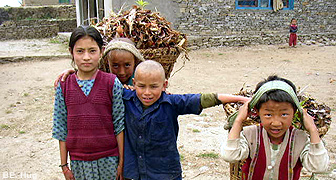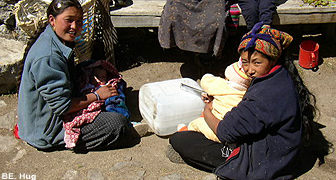 STATEMENT
BY THE UK SPECIAL REPRESENTATIVE FOR NEPAL STATEMENT
BY THE UK SPECIAL REPRESENTATIVE FOR NEPAL |
| December
2004 - PRESS Report |
 |
| This
is another in the series of visits since my appointment nearly two years
ago. Just to recap - my role is to help coordinate, at the London end,
British Government support for peace, stability and development in Nepal,
and to help strengthen our consultation and coordination with Nepal's other
international partners. |
|
As
on previous visits, I have met the Prime Minister and a wide range of representatives
from the Government, the political parties, civil society, and the international
community.
It
is acutely disappointing that the conflict continues unabated, bringing
suffering and hardship across the country, as well as damage to the economy
and to the livelihoods of the Nepalese people. We continue to believe that
there can be no acceptable military solution to the conflict. The only
sure way to a lasting peace is through negotiations conducted with good
faith and willingness to succeed.
This
underlines the urgent need to initiate and sustain an effective peace process. We
welcome the Government's willingness to enter into negotiations without
preconditions. We call upon the Maoists to respond constructively and to
seize the opportunity for peace. We recognise the complexity of the
situation, but also the need for compromise and accommodation on all sides.
The status quo is not an option. But the overall objective should be a
settlement based on multiparty democracy and constitutional monarchy which
allows free and fair elections to the national parliament and other representative
institutions. This requires all parties to renounce violence, but it would
also give all parties the right to form a government, or participate in
government, if successful in elections. We believe that with trust and
goodwill, it should be possible to forge agreement on this basis.
In
the meantime, it is essential to maintain the democratic framework, including
a broad based, multi-party government. It is also essential, in the face
of the Maoist threat to democracy, to uphold the rule of law, and to maintain
democratic space and freedoms. The role of a free media and civil society
remains as important as ever. There is a clear need for all the constitutional
forces to work together, within a democratic framework, to bring about
peace and the full restoration of parliamentary democratic institutions.
The country cannot continue indefinitely without a functioning parliament.
Given
the worsening conflict, respect for human rights becomes even more necessary. We
underline once more the responsibility of the Government and the security
forces to exercise their powers in full compliance with domestic and international
law. There is still serious concern at the evidence of widespread violations
by the security forces, including extra-judicial killings, illegal detention,
disappearances, abuse of prisoners, and failure to observe due process
of law. We acknowledge and welcome measures taken to counter such abuse,
but much more remains to be done. The agreement with UN OHCHR to strengthen
the role of the National Human Rights Commission in monitoring and investigating
violations is a valuable step forward and we look forward to full cooperation
from the government and security forces in its implementation. Cooperation
too with UN organisations and procedures will help the government to meet
its obligations.
We
also condemn the continuing brutality and violence by the Maoists, which
include murder, terrorist attacks, the use of child combatants, abduction,
extortion and forced migration. Recent events at Dailekh and elsewhere
have shown the revulsion of ordinary people affected by Maoist violence.
We call upon the Maoist leadership and their cadres to prevent such abuse,
and to abide by accepted international standards.
The
overall situation highlights once more the potential value of a Human Rights
Accord, to which both sides should subscribe, as a means to establish greater
accountability and respect for human rights norms.
Together
with other members of the international community, the UK continues to
provide assistance to poor and vulnerable people throughout the country.
Our emphasis is on support that has immediate impact by, for example, giving
wage earning opportunities to the poorest members of rural communities
and improving their access to essential services such as clean water. This
vital work needs to continue without hindrance in order to help prevent
a humanitarian crisis.
As
usual, it seems, Nepal faces difficult and critical months ahead. Nonetheless,
we still believe that the opportunity exists to make real progress towards
resolution of the conflict, provided all sides are prepared to forge a
basis for negotiations. For its part, Britain remains committed to encourage
and support the pursuit of a peaceful and democratic outcome, as well as
development and reform.
Source:
Foreign and Commonwealth Office of the British Government
Statement
of Sir Jeffrey James, UK special representative for Nepal
December
2004 - PRESS Release
 Nepal:
Visit by EU Troika of Regional Directors Nepal:
Visit by EU Troika of Regional Directors |
 |
| A
European Union (EU) Troika will travel to Kathmandu from 13 to 15 December
2004. This is the first time ever that the EU has sent a Troika to Nepal. |
|
The
Troika is due to have meetings with high-level representatives of the Government
of Nepal (including the Prime Minister, the State Minister for Foreign
Affairs, and the Chief of Army Staff) and civil society, as well as representatives
of the international community resident in Nepal.
The
Troika travels under a mandate from all Member States of the EU to convey
to the authorities in Kathmandu the growing level of concern felt throughout
the Union at the situation in Nepal. The aim of the Troika is therefore
to offer EU support to all efforts aimed at curtailing violence and renewing
dialogue between the Government and the Communist Party of Nepal (Maoist).
The EU calls upon all constitutional forces to work closely together in
support of a common strategy for achieving a comprehensive and inclusive
settlement in Nepal, based upon multi-party democracy and constitutional
monarchy. The Troika will also express the EU's grave concern at the
human rights situation in Nepal and the abuses committed by both sides.
The
Troika will be led by Mr Robert Milders, Director for Asia in the Netherlands
Ministry of Foreign Affairs, representing the Presidency of the EU. The
European Commission will be represented by Ms Laurence Argimon-Pistre,
Head of Unit for South Asia. The incoming Luxembourg Presidency of the
EU will be represented by Ms Peggy Frantzen. The High Representative for
Common Foreign and Security Policy, Mr Javier Solana, will be represented
by an official from the General Secretariat of the
Council of the EU.
Source:
European Union, Human Rights
|
Peace
- Preserving Nepal's Future |
|






